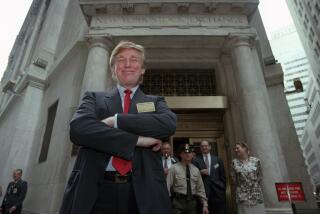He Offers Thanks for N.Y.’s Hospitality : Gorbachev Gracious in Hasty Departure
- Share via
NEW YORK — Grim-faced but gracious, Soviet President Mikhail S. Gorbachev took leave of New York in haste Thursday, shaken by bad tidings from home yet clearly touched by what he had seen and heard in the citadel of capitalism.
What was most on his mind as he bade farewell was the tragedy that drew him home--the earthquake that, he said soberly, had wrought “extremely severe and extremely grave consequences, devastation and grave loss of life” in Armenia and neighboring Soviet republics.
Yet in a departure ceremony at Kennedy International Airport, Gorbachev wanted also to make clear his gratitude “to New Yorkers for the hospitality and feelings of friendship that they have been expressing over these days. . . . We value that very much.”
His had been a whirlwind trip: a major address to the United Nations, an informal luncheon with President Reagan and President-elect George Bush, a reception for international dignitaries--all in a single day.
But it was the smiles and huzzahs from the people on the street that seemed most to stay with him--the crowd-lined avenues, the frantic waves and throaty cheers, the raw adulation that swept over him as he stepped out of his limousine in the Broadway theater district.
Indeed, Gorbachev reflected as he prepared to depart U.S. soil, such gestures of good will “may have been one of the most important things that happened on this day of our stay in America.” They demonstrated, he said, “increasing respect and friendliness and willingness to cooperate on the part of the Soviet people and the American people.”
A master of public relations, Gorbachev merely may have been playing his role to the hilt, polished despite tragedy, courting favor with the deftness that has made him a hero to much of the European public.
But Gorbachev the tourist had seemed truly wide-eyed, as delighted with New York as its citizens were with him. He had planned Thursday to open a trade exhibition, visit a school, tour an art museum and host a party of own.
Calls From Bush, Reagan
The earthquake put an end to such fancy, setting off a 13-hour frenzy that began with a post-midnight announcement at the Soviet Mission that the visit would be cut short. It ended shortly after 1 p.m. EST, when Gorbachev’s Ilyushin-62 aircraft began a 12-hour return flight to Moscow.
Early Thursday, Gorbachev spoke by telephone with both Reagan and Bush. The president-elect called the Soviet leader to recount his approval of the meeting among the three men and to declare his regret about the “horrible disaster” in the earthquake-torn Caucasus.
Bush later told reporters that Gorbachev had said the earthquake struck “right in the middle of the day, and he said (more) children in kindergarten, and boys and girls in schools, and workers in the workplace lost their lives because of the time it struck.”
Meanwhile, a delegation of leaders from the Armenian Church of North America that had hoped to meet with Gorbachev was instead ushered into the Soviet Mission for a substitute meeting with high Soviet officials.
Members of the delegation had hoped to press their appeal for the government to halt what they call oppression and persecution of Armenians in the neighboring republic of Azerbaijan. But the initial agenda gave way to the urgency of dealing with the earthquake, according to Archbishop Vatche Hovsepian of Los Angeles, primate of the church’s western diocese.
Hovsepian said the Soviets feared that political turmoil in Azerbaijan might exacerbate the natural disaster. Soviet leaders, he said, asked the bishops to help do what they could to calm the political climate, which has been increasingly unstable since protests and violence erupted in February.
The Armenian delegation, while insisting on its right to protest, also lavished rare praise on the Soviet leader for his decision to cut short his trip and for taking steps to cut away the red tape that might otherwise have blocked aid pouring forth from Armenians worldwide.
But at P.S. 6 on the Upper East Side, at the Metropolitan Museum of Art and in Central Park, there was disappointment. All had expected visits from Gorbachev and his wife, Raisa; now they would have to wait for another visit.
For police, the change in plans made necessary a mad overnight dash to do Thursday what had not been scheduled until today--the preparation of the highways for Gorbachev’s departure.
What time had Police Chief Robert Johnston heard the news, and what had been his reaction? His answers: “12:30” and “panic.”
But by early Thursday thousands of officers were in place to seal off the route to Kennedy Airport, slowing traffic but never causing the “glasnost gridlock” feared by New Yorkers.
Times staff writers Cathleen Decker and Karen Tumulty contributed to this story.
More to Read
Sign up for Essential California
The most important California stories and recommendations in your inbox every morning.
You may occasionally receive promotional content from the Los Angeles Times.













